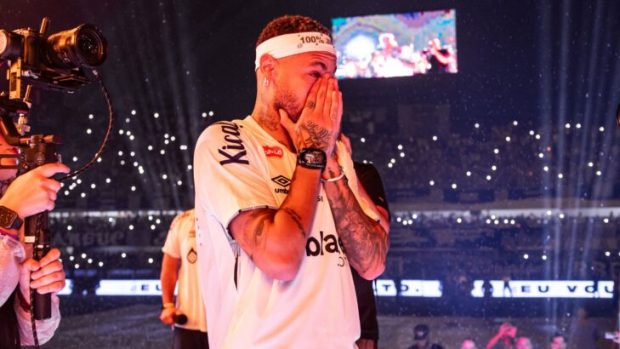The celebrations were in full swing at Crystal Palace.
“Have you ever seen Brighton win a cup?” was the fans’ choice of pre-match song. Glad All Over blared over the PA system and, even after the music concluded, its final verses were sung with gusto. Shakira’s Waka Waka song saw its lyrics adapted to end with, “We won the FA Cup,” and boomed out frequently.
Advertisement
It was an emotional but celebratory atmosphere at Selhurst Park before Palace’s final home game of the season with Wolverhampton Wanderers. Thoughts drifted to a European adventure, with Saturday’s historic FA Cup win securing qualification for the Europa League.
“We’re all going on a European tour,” sang the fans midway through the first half. They delivered another rendition after going 2-1 up. A final rendition came in stoppage time at the end of their 4-2 win, which ensured they will finish the season with their highest Premier League points tally, before the stadium DJ played the Europa League anthem after the game.
It was all a nod to a first participation in a major UEFA competition, with thoughts already eagerly turning to the draw for the Europa League’s league phase in Monaco on August 29.
But before any of that happens, there could be one major obstacle.

Palace celebrate Eberechi Eze’s fourth goal against Wolves (Richard Pelham/Getty Images)
So, what is the potential issue?
UEFA only officially determines who will participate in its competitions the following season once the current campaign has concluded. But the domestic cup winners of UEFA’s seven highest-ranked associations are entitled to play in the Europa League.
That means the FA Cup winners — Palace — are, in principle, eligible.
In France, fellow Eagle Football-owned side Lyon finished sixth in Ligue 1 to scrape into the Conference League. However, should Paris Saint-Germain beat Reims in the Coupe de France final on Saturday, then the cup winners’ spot will move down a place in the league and Lyon will enter the Europa League.
For context, Reims finished 16th and will play in the relegation play-offs.

Lyon’s Alexandre Lacazette (right) celebrates his goal with Rayan Cherki against Angers on Saturday (Olivier Chassignole/AFP via Getty Images)
Eagle Football is the majority owner of Lyon, with an 88 per cent stake, having bought the club in December 2022. John Textor, the fourth general partner at Palace as a representative of Eagle, is chairman of the group.
UEFA’s rules, however, restrict teams from multi-club groups playing in the same competition. While there may still be ways around this, the deadline set by European football’s governing body to address any multi-club ownership issues passed on March 1 — on the day Palace beat Millwall in the fifth round of the FA Cup, when any talk of lifting the trophy felt fanciful.
Advertisement
What is Eagle’s stake in Palace?
Eagle owns a 43 per cent stake in Palace. Textor originally purchased a 40 per cent stake by himself in 2021 before moving it into Eagle, a multi-club group he created that also holds majority stakes in Brazilian champions Botafogo, Belgian second division side RWD Molenbeek and, most recently, Lyon.
Textor later increased his stake to 45 per cent before it was diluted back to 43 per cent. He does, however, only have an equal 25 per cent share of the voting rights at Palace alongside his fellow general partners Josh Harris, David Blitzer and chairman Steve Parish.

Textor looks on from the stands before Lyon’s game against Monaco this month (Clement Mahoudeau/AFP via Getty Images)
What is UEFA’s attitude towards multi-club ownership?
UEFA’s rules detail the multi-club ownership criteria that had to be satisfied in March, with clubs expected to comply until the end of the season when they competed in European competition. They state:
“No club participating in a UEFA club competition may, either directly or indirectly, hold or deal in the securities or shares of any other club participating in a UEFA club competition; … be involved in any capacity whatsoever in the management, administration and/or sporting performance of any other club participating in a UEFA club competition; or have any power whatsoever in the management, administration and/or sporting performance of any other club participating in a UEFA club competition.
“No one may simultaneously be involved in any capacity whatsoever in the management, administration and/or sporting performance of more than one club participating in a UEFA club competition.
“No individual or legal entity may have control or influence over more than one club participating in a UEFA club competition, (including) holding a majority of the shareholders’ voting rights; having the right to appoint or remove a majority of the members of the administrative, management or supervisory body of the club; being a shareholder and alone controlling a majority of the shareholders’ voting rights pursuant to an agreement entered into with other shareholders of the club; or being able to exercise by any means a decisive influence in the decision-making of the club.”
Advertisement
The rules have been relaxed slightly, as explained by The Athletic in 2024, so UEFA may allow Palace into the Conference League, Europe’s third-tier tournament, even if the above criteria are not satisfied.
Solutions have been found when situations involving multi-club groups have previously cropped up, though that deadline for mitigation on March 1 may cause Palace a particular headache if UEFA opts against making further concessions.
Why would Palace be penalised and not Lyon?
This is also addressed within Article 5 of UEFA’s regulations, explaining how the club ranked highest in its domestic championship may be admitted.
In this case, Lyon finishing sixth would trump Palace’s final position in the Premier League, granting the French side access to the second-tier Europa League.

Palace’s players undertake a pre-match huddle at Selhurst Park (Charlie Crowhurst/Getty Images)
But could Lyon miss out on UEFA competition altogether?
Should Lyon fail to convince the Direction Nationale du Controle de Gestion (DNCG), the organisation responsible for monitoring and overseeing the accounts of professional clubs in France, that their finances meet the conditions laid out last November when the DNCG provisionally relegated them and issued a January transfer ban following an audit of their finances, then there is a chance UEFA may not admit them into their competitions.
Textor, however, has pushed back strongly against any suggestion that Lyon could be banned from Europe and is confident the club’s finances are in order.
What has Eagle Football’s contribution been to Palace?
Textor’s arrival in August 2021 provided the funding for Palace to overhaul their ageing squad with younger talent. Without that influx of cash, they might not have been able to afford Joachim Andersen, Marc Guehi, Michael Olise and other players.
It also helped Palace avoid taking on as much debt at high interest rates. Textor’s investment also significantly aided the club’s £30million ($40m) academy redevelopment.
Advertisement
He collaborated with former sporting director Dougie Freedman to identify potential transfer targets, particularly in South America, and it was Textor who championed the appointment of Oliver Glasner as manager in February 2024.
Although Textor, subsequently through Eagle, has made a notable contribution to Palace’s success, the complicated ownership structure has caused tension in the boardroom with Textor and Parish, who has never been in favour of multi-club ownership in football, not always aligned in their views of how the club should operate.

Parish, co-owner and chairman of Palace, arrives at Selhurst Park for Tuesday’s win over Wolves (Richard Pelham/Getty Images)
How can the situation be rectified?
The quickest and most obvious solution would be for Eagle to sell its shares in Palace, a process its decision-makers have been exploring for some time (and before UEFA’s March 1 deadline to separate ownership). To do so to, Harris and Blitzer, who have a right of first offer, would be the swiftest way, but they are not discussing that option at present.
Several other parties have expressed an interest.
Textor could convince UEFA to allow him to place Eagle’s Palace shares in a blind trust for a year, as Evangelos Marinakis has done with Nottingham Forest. The Forest owner also controls Olympiacos. Alternatively, Textor might do the same for Lyon.
Textor might also make sufficiently convincing representations to UEFA that his involvement with Palace does not breach its criteria, given the club’s ownership structure only allows him 25 per cent voting rights. The American is in Bilbao for tonight’s Europa League final and could argue he has no controlling interest in Palace’s voting rights or operational influence, and the club itself has no relationship with Lyon.
That, admittedly, may prove a hard sell.
— Crystal Palace F.C. (@CPFC) May 19, 2025
Have Palace been close to European football before?
In Palace’s finest top-flight campaign, when they finished third in 1990-91 under Steve Coppell’s management, they were denied what they thought would be a UEFA Cup place. English clubs had been banned from European competition following the Heysel disaster in 1985, with Liverpool handed an extended ban.
However, Liverpool’s ban was lifted a few weeks before the end of the campaign, meaning Palace missed out.
It is far from a certainty that they will be denied again. Representations can be made to UEFA by Palace or Textor in search of a solution. Eagle, desperate to avoid denying Palace their place in Europe, could yet conclude a sale of its shares.
The club, for their part, are confident they will be granted entry. “Europa League group games, travelling all over Europe, Palace on tour… this is stuff the fans have been dreaming about for too long,” said Parish after Saturday’s Wembley success.
Regardless, UEFA will be watching on with interest.
(Top photo: Richard Pelham/Getty Images)
This news was originally published on this post .









Be the first to leave a comment